And so Series 11 of Doctor Who ends as it begins. And pretty much as it continued throughout the whole season. Small cast of guest stars, Yasmin not so much sidelined as kept to a minimum, the Doctor running around trying to find a peaceful solution to everything, a couple of modern-day messages (perverted religion is bad, blind faith is bad, killing is bad), and a guy with teeth stuck in his face.
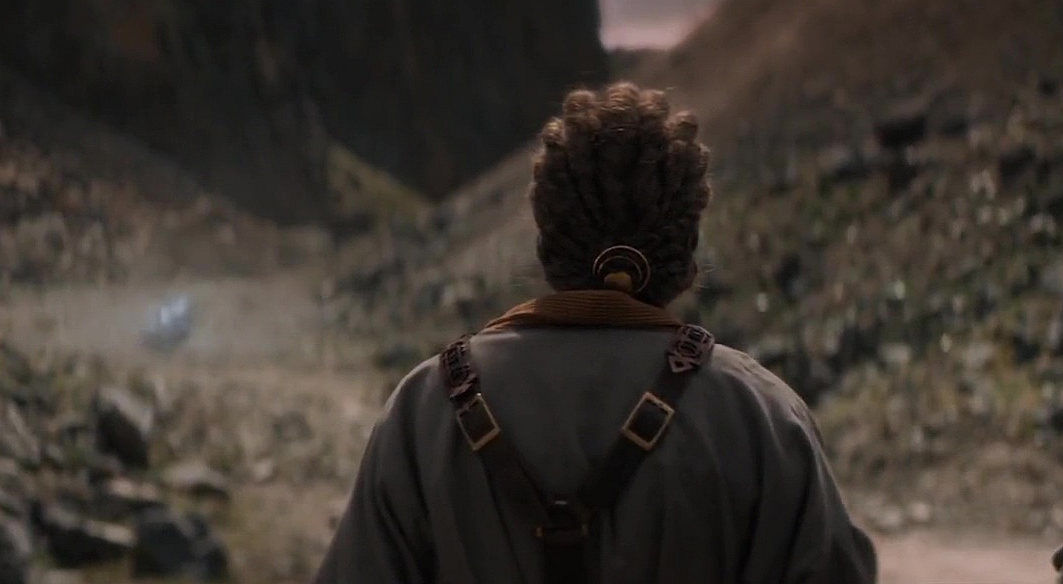
And the whole thing takes place on a relatively small scale. There's a lot of big concepts tossed around here. "Tim Shaw" coincidentally ends up on a planet in front of two super-powered religious types. He uses their powers to steal some planets, shrink them down, and swears revenge on the galaxy. As the Fourth Doctor once said, "You wouldn't know what to do with it, beyond shout at it."
In fact, the episode reminds me of the original series' "The Pirate Planet". Evil nasty bad guy, capturing planets and keeping them in a collection, and another race with psychic abilities. But why does it remind me of "The Pirate Planet"? Let's find out.
After a brief opening where two humanoid aliens (Phyllis Logan, Percelle Ascott) known as the Ux have an enigmatic conversation, one of them displays some extra-dimensional superpower abilities, and a mysterious alien appears in front of them...
... cut to the TARDIS. The TARDIS team respond to nine distress calls from the planet Ranskoor Av Kolos. They materialize in one wreck and find a captain, Paltraki (Mark Addy). Paltraki doesn't remember much of anything because the planet emits psychotropic waves that scrambled the mind. The TARDIS Team have neural balancers to prevent the planet's effects on them.
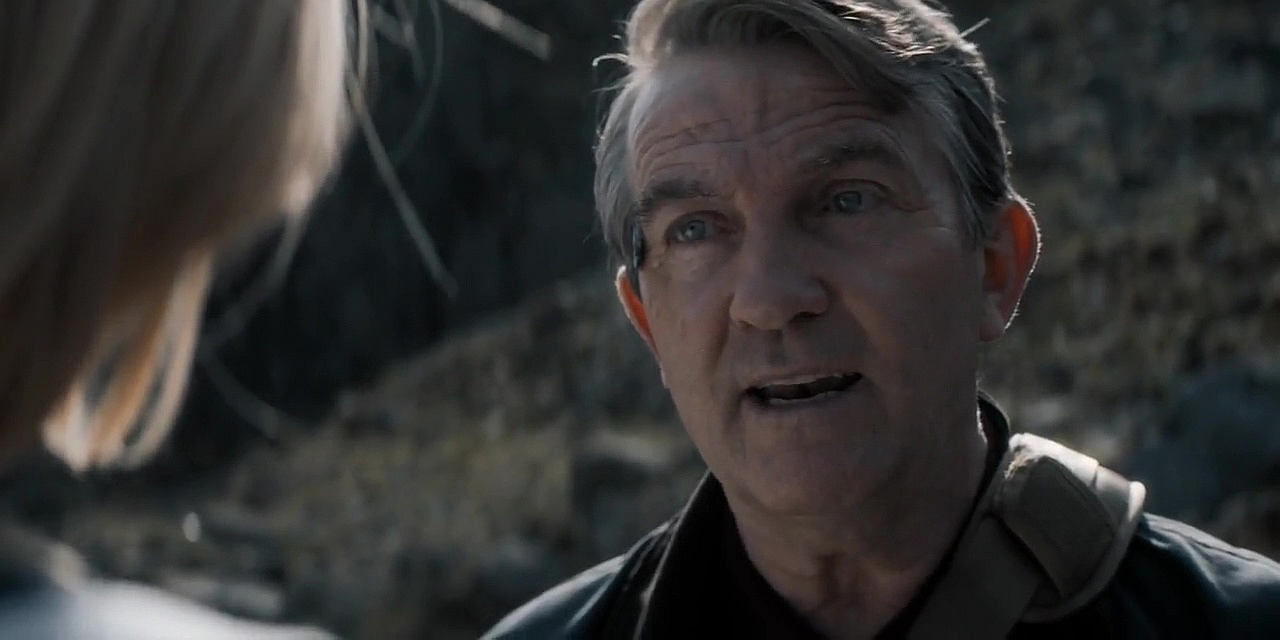
Once they slap a neural balancer on Paltraki, he vaguely remembers that his ship and eight others came there to do something frightfully impressive. They make their way to the Edifice, a big stone structure floating in mid-air. When they get in, Graham and Ryan look for Paltraki's missing crew. Yasmin and Paltraki try to figure out what Paltraki was doing earlier by following his mission briefing route on a datapad. The Doctor goes looking for Tim Shaw (Samuel Oatley) of the Stenza, who earlier contacted Paltraki's crew and demanded they hand over a crystal with a sphere in the center. The crystal was on Paltraki's ship, and the Doctor is carrying it around. It turns out the alien who landed in the opening tag is Tim, from "The Woman Who Fell to Earth". Graham wants to kill the alien since he killed Grace, and the Doctor isn't big on the idea.
Graham and Ryan find the captives and free them from their stasis chambers. Yasmin and Paltraki don't do much of anything except find four more similar crystals. The Doctor confronts Tim, who is getting by on life support. He explains how he's harnessed the power of the Ux to exact revenge. They believe Tim is their god, and obligingly shrunk down five planets that were the Stenza's mortal enemies and stored them in the crystals.
(Please, hold all questions until the end of the tour.)
Now, Tim is having the Ux grab Earth since he was defeated there. The Doctor warns that the equipment won't handle the stress of a sixth planet, and manages to combine the power of the second Ux, Delphin, with the TARDIS to stop the attack on Earth and return the five planets to their rightful places. Tim goes after Graham, but Graham takes him out with some help from Ryan and they lock Tim in a stasis cell. At the end, the female Ux, Andinio, is unhappy her "god" has been shot out from under her. Delphin asks Paltraki to take them away with him as he returns the captives. The Doctor makes a brief speech and leaves. The end.
And that's it until the Who's Year Day Special on 1/1/19.
The main problem with "Battle" is all of the unanswered questions that it leaves. Why does Paltraki have one of the crystals? Why is Tim so big on getting it back: is it of any more use to him in his storage room then elsewhere on the planet? Why do the Ux think Tim is their god? Or why, if he is a god, he needs their power? Setting aside that the Ux already have godlike powers--everything is relative—does their god stick teeth in his face? We don't learn anything about their beliefs to have any reason to accept that they consider Tim their god.
And the residents of those five planets are dead, and presumably didn't get better just because they were returned to their locations. The Doctor mentions genocide, so presumably they were killed. So... the Doctor choosing not to kill Tim Shaw ended up in multi-planet genocide. Gee, thanks, Doc.Nobody comments on the irony of the Doctor trying to find a peaceful solution that ends up killing billions.
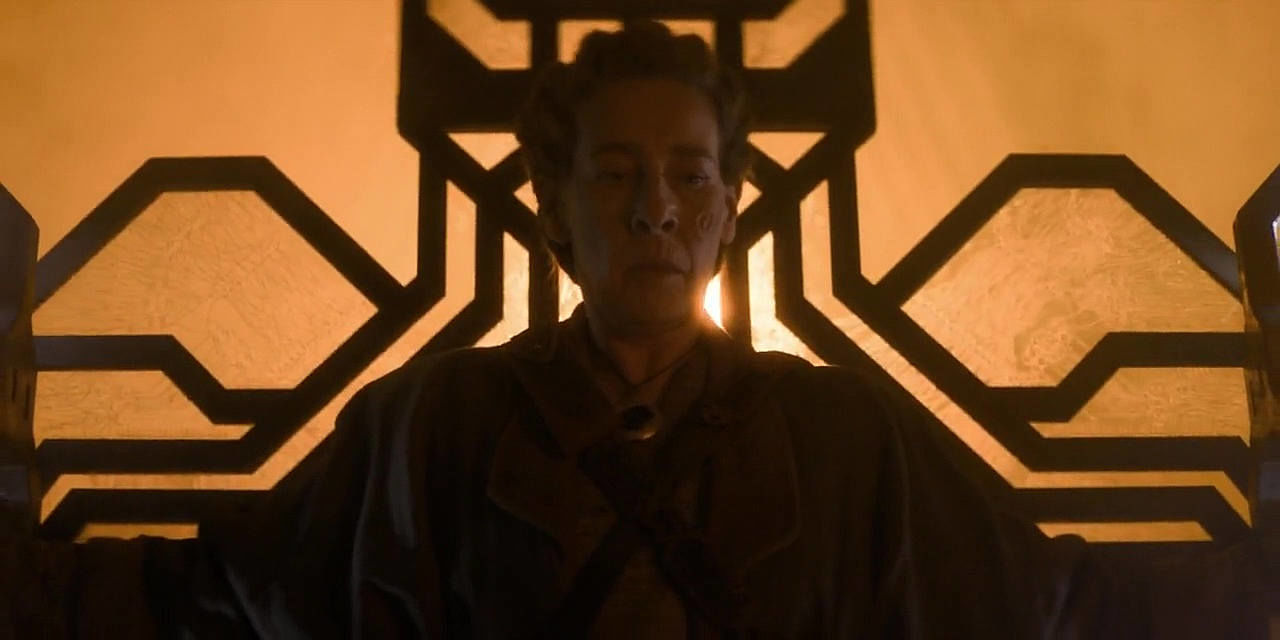 There's also an absurd level of coincidence here: Tim just happens to land on the planet, just in time for the two Ux to see him. And they just happen to have the power Tim needs to exact his plan for revenge.
There's also an absurd level of coincidence here: Tim just happens to land on the planet, just in time for the two Ux to see him. And they just happen to have the power Tim needs to exact his plan for revenge.
There's also stuff that just goes nowhere. We hear a fair amount early on about the psychotropic waves. But later when the Doctor and Yasmin (briefly) remove their balancers, they're fine. Tim is on life support,. but he detaches from it and is fine as he hunts down Graham.
The main problem is the episode tries to be big and season-finale-ish. But... it isn't. Tim is a single threat, who just happens to stumble on the power he needs because of two poor dopes who mistake him for their god. Tim just isn't that impressive, sorry. There's been no effort past the first episode to build Tim up as any kind of threat, much less one of galactic import. You've got the Daleks, and the Cybermen, and the Weeping Angels, and the Silence. And... some poor schmuck that is mistaken for a god, wanders into some worshipers with powers, and is momentarily more trouble than he was before. We're not talking Davros, here: this is a bad guy who got lucky, has some lame and useless scheme, and the Doctor sorts him out in one episode. The few billion dead don't even get a hand wave.
The performances are good, as far as they go. Bradley Walsh as Graham, who decides to get revenge for Grace and is willing to go up against the Doctor, is well-performed. I would have been sad to see Walsh go, even though they went the obvious (and speedy) route of having him back out of his quest for revenge at the last minute. I suppose you could also argue regenerative differences, but I don't recall Four being so deadest against companions killing as Thirteen is here. Just ask Leela.
Tosin Cole is okay as Ryan: I like his slowly-developing relationship throughout the season with Graham as his granddad. His dyspraxia has conveniently come and (mostly) gone. And there still seems to be something going on with his missing father that we may never find out about. Yasmin (Mandip Gill) has been pretty much a waste. She's a policeman and a family person, but neither have ever been present except when absolutely necessary. Yasmin doesn't get to do police stuff, her family only showed up a couple of times when it became convenient.
Jodie Whittaker as Thirteen at least gets to sink her teeth into a Doctor Who villain this week. But he's small potatoes, which means that it's hard for her to be impressive when confronting him when there isn't much there to confront. Tim is on life support and can barely move until he needs to: the Doctor launches a few barbs, banters with him, runs off, and does some techno-babbly stuff to sort him. Samuel Oatley is okay enough in the role, but the creative team just doesn't give him much to be okay about.
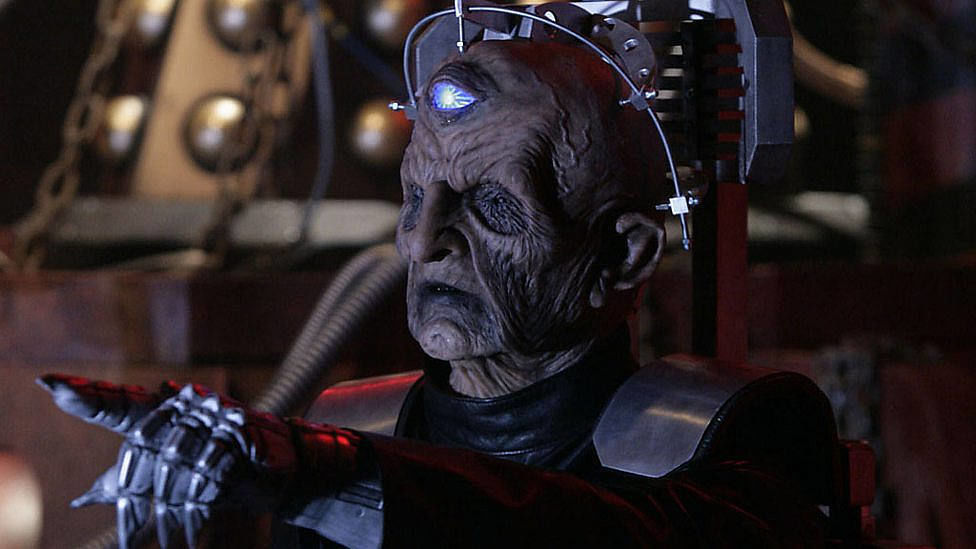
Overall, "Battle" is pretty representative of Series 11: it's a small-scale threat, the bad guy isn't that impressive, and the threat is too easily defeated. There's nothing here that screams "classic". There's no classic villain, no classic showdown or battle of wits, the companions aren't that memorable. You may not like Davies and/or Moffat, but at least they had vision. Davies did more family stuff and real-life, Moffat did more timey-wimey stuff with some "classic" Doctor Who tossed in. Deliberately or otherwise, Chris Chibnall has tried not to duplicate them. Which is great, but he needs to provide something of his own. A female Doctor isn't enough.
And wasn't that a bust. so to speak? Maybe not a bust, but at the end of the day Thirteen isn't any different than her predecessors. I didn't expect her to be, but the impression I got was that a lot of people did. The gender of the Doctor is irrelevant, as many people argued when the sex change was put out there. However, that meant that at the end of the day, changing her from male to female accomplished nothing. It went from "Whether the Doctor is male or female doesn't matter" to "The Doctor is female now: what does it matter?"
Overall, Series 11 was a snoozer. There was nothing bad about it, but nothing particularly great or memorable about it, either. It felt like a bundle of SJW issues bundled together and tossed at the screen. And I couldn't tell you what in Series 12 should be done differently. Not a return to "classic" Doctor Who, but at least give us more of what made the 2005+ series popular. Better monsters. More... monstrous monsters. Not pieces of floating cloth, guys with overheating guns, and some Predator-type with teeth stuck in his face.
And do some two-parters. It takes time to build up a suitable monster. Often we were just getting to know Tim Shaw, or the Morax, or the Solitract... and then they're gone.
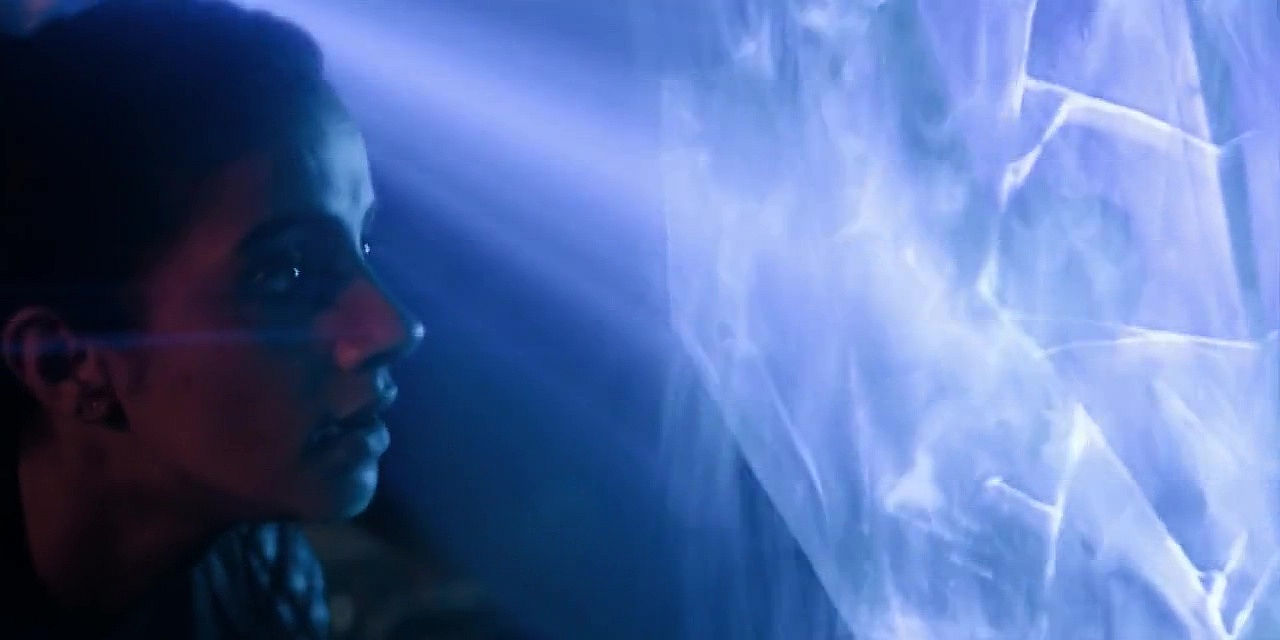
Also, despite the recent news that everyone is returning, my advice would be... lose a companion a few episodes down the road. I think that three companions in the TARDIS are fine. It's worked before and can work again. But not if they're underdeveloped and underused. My pick would be Yasmin, who by far is the most underdeveloped and underused. of the current group. I suppose that means that they'd have to dump Ryan as well, since "at least one female companion" seems to be a basic requirement of the show. If they keep Ryan, then they'd have two men and one woman, and we'd be back where we started.
``
And dump the SJW element or at least cut it back. A lot. Which would also mean dumping Yasmin. The biggest thing she brought to Series 11 is her race. If the show has ever had a token, Yasmin is it.
Note that I'm okay with some "SJW elements" in the show. Doctor Who has always been relatively big on the anti-violence and women's equality and all of that good stuff. But cramming several into a single episode, in episodes week after week, is a bit much. As is focusing on it as much as they have. We've heard more about Yasmin being of Indian descent then we did about Billie being a lesbian. Yasmin's root hasn't been as... integral to the stories. We didn't need a story about Stonewall or Harvey Milk for Billie, but we got "Demons of the Punjab" for Yasmin. As far as Ryan, at least "Rosa" was about American 50s racism, which tended to divorce it a bit from his experience. Yes, he mentioned racism in the UK in 2018, but we didn't get a whole story about it.
Granted, we haven't seen the holiday special "Resolution" yet. Maybe it will be an incredible piece of storytelling that brings it all together. But... I doubt it. And even if it is, I'm here to review what is on the TV now and what has come before, not what will be on in three weeks.
But that's just my opinion, I could be wrong. What do you think?
Written by Gislef on Dec 10, 2018




No comments yet. Be the first!